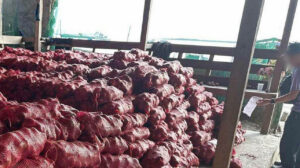THE Department of Agriculture (DA) said the streamlined food import process under Administrative Order No. 20 will be open only to legitimate traders to prevent abuse of the rules by would-be smugglers.
“We will be giving all the necessary safeguards” to ensure that the system is not abused, Agriculture Assistant Secretary and Spokesperson Arnel V. de Mesa said by telephone.
“There are still 30 days for us to prepare the guidelines,” he added.
Administrative Order No. 20 (AO 20) instructed the Departments of Agriculture (DA), Finance (DoF), and Trade and Industry (DTI) to remove nontariff barriers to imports of farm goods.
The DA was also tasked with simplifying administrative procedures for imports of sugar and fisheries products.
Mr. De Mesa added that AO 20 is mainly focused on making agricultural imports for legitimate importers easier.
The mandate also aimed at streamlining the requirements and procedures for the approval of importers.
“(The AO) is still subject to further study by the DA to ensure that we are protecting our farmers,” he added.
Mr. De Mesa said that if domestic production were to increase, there would be less need to import, as happened with rice.
Palay (unmilled rice) production was 20.06 million metric tons (MT) in 2023, according to the Philippine Statistics Authority, against 19.76 million MT in 2022.
Rice imports, on the other hand, declined to 3.62 million MT last year from 3.83 million MT in 2022, according to the Bureau of Plant Industry.
Samahang Industriya ng Agrikultura Executive Director Jayson H. Cainglet said that the new import procedures will not open the country to more undervalued or misdeclared agricultural imports.
“We also hope that the same zest and commitment to ease (of) doing business for the importers pampered by the economic team will also be applied to domestic producers that continue to face stringent requirements,” Mr. Cainglet said in a Viber message.
Senator Maria Imelda Josefa Remedios R. Marcos said that easing import restrictions will lead to reduced prices of onions, fish, pork, and sugar.
“But this will also impact local producers — particularly onion farmers even now selling well below their production cost. Frequent consultations between farmers, consumers and other stakeholders will be essential to monitor and evaluate the effects of AO 20,” Ms. Marcos said in a statement.
She added that further investigation and intervention is needed to address the gap between farmgate and retail prices of farm goods.
AGRI Party-List Representative Wilbert T. Lee said that farmers and fisherfolk should also be provided more support to increase their production and address the high prices of food.
“We understand the purpose of AO 20 is to immediately lower the price of goods and reduce the burden on our consumers. But we can consider this as a short-term solution,” Mr. Lee said in a statement. — Adrian H. Halili
